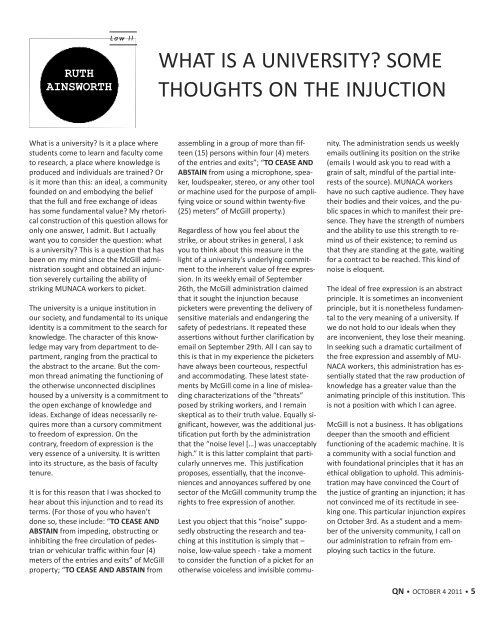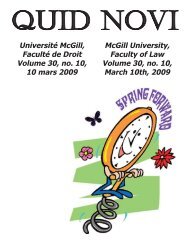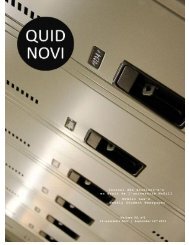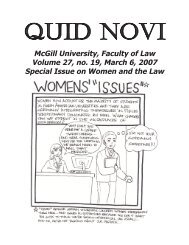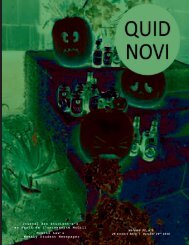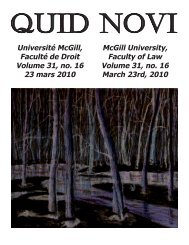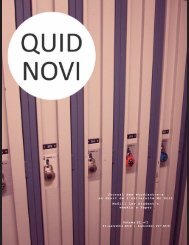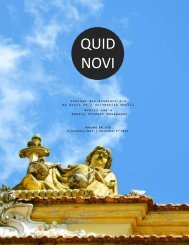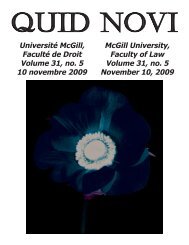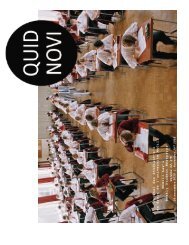October 4, 2011 - Latest Issue - McGill University
October 4, 2011 - Latest Issue - McGill University
October 4, 2011 - Latest Issue - McGill University
Create successful ePaper yourself
Turn your PDF publications into a flip-book with our unique Google optimized e-Paper software.
RUTHAINSWORTHL a w I IWHAT IS A UNIVERSITY? SOMETHOUGHTS ON THE INJUCTIONWhat is a university? Is it a place wherestudents come to learn and faculty cometo research, a place where knowledge isproduced and individuals are trained? Oris it more than this: an ideal, a communityfounded on and embodying the beliefthat the full and free exchange of ideashas some fundamental value? My rhetoricalconstruction of this question allows foronly one answer, I admit. But I actuallywant you to consider the question: whatis a university? This is a question that hasbeen on my mind since the <strong>McGill</strong> administrationsought and obtained an injunctionseverely curtailing the ability ofstriking MUNACA workers to picket.The university is a unique institution inour society, and fundamental to its uniqueidentity is a commitment to the search forknowledge. The character of this knowledgemay vary from department to department,ranging from the practical tothe abstract to the arcane. But the commonthread animating the functioning ofthe otherwise unconnected disciplineshoused by a university is a commitment tothe open exchange of knowledge andideas. Exchange of ideas necessarily requiresmore than a cursory commitmentto freedom of expression. On thecontrary, freedom of expression is thevery essence of a university. It is writteninto its structure, as the basis of facultytenure.It is for this reason that I was shocked tohear about this injunction and to read itsterms. (For those of you who haven’tdone so, these include: “TO CEASE ANDABSTAIN from impeding, obstructing orinhibiting the free circulation of pedestrianor vehicular traffic within four (4)meters of the entries and exits” of <strong>McGill</strong>property; “TO CEASE AND ABSTAIN fromassembling in a group of more than fifteen(15) persons within four (4) metersof the entries and exits”; “TO CEASE ANDABSTAIN from using a microphone, speaker,loudspeaker, stereo, or any other toolor machine used for the purpose of amplifyingvoice or sound within twenty-five(25) meters” of <strong>McGill</strong> property.)Regardless of how you feel about thestrike, or about strikes in general, I askyou to think about this measure in thelight of a university’s underlying commitmentto the inherent value of free expression.In its weekly email of September26th, the <strong>McGill</strong> administration claimedthat it sought the injunction becausepicketers were preventing the delivery ofsensitive materials and endangering thesafety of pedestrians. It repeated theseassertions without further clarification byemail on September 29th. All I can say tothis is that in my experience the picketershave always been courteous, respectfuland accommodating. These latest statementsby <strong>McGill</strong> come in a line of misleadingcharacterizations of the “threats”posed by striking workers, and I remainskeptical as to their truth value. Equally significant,however, was the additional justificationput forth by the administrationthat the “noise level […] was unacceptablyhigh.” It is this latter complaint that particularlyunnerves me. This justificationproposes, essentially, that the inconveniencesand annoyances suffered by onesector of the <strong>McGill</strong> community trump therights to free expression of another.Lest you object that this “noise” supposedlyobstructing the research and teachingat this institution is simply that –noise, low-value speech - take a momentto consider the function of a picket for anotherwise voiceless and invisible community.The administration sends us weeklyemails outlining its position on the strike(emails I would ask you to read with agrain of salt, mindful of the partial interestsof the source). MUNACA workershave no such captive audience. They havetheir bodies and their voices, and the publicspaces in which to manifest their presence.They have the strength of numbersand the ability to use this strength to remindus of their existence; to remind usthat they are standing at the gate, waitingfor a contract to be reached. This kind ofnoise is eloquent.The ideal of free expression is an abstractprinciple. It is sometimes an inconvenientprinciple, but it is nonetheless fundamentalto the very meaning of a university. Ifwe do not hold to our ideals when theyare inconvenient, they lose their meaning.In seeking such a dramatic curtailment ofthe free expression and assembly of MU-NACA workers, this administration has essentiallystated that the raw production ofknowledge has a greater value than theanimating principle of this institution. Thisis not a position with which I can agree.<strong>McGill</strong> is not a business. It has obligationsdeeper than the smooth and efficientfunctioning of the academic machine. It isa community with a social function andwith foundational principles that it has anethical obligation to uphold. This administrationmay have convinced the Court ofthe justice of granting an injunction; it hasnot convinced me of its rectitude in seekingone. This particular injunction expireson <strong>October</strong> 3rd. As a student and a memberof the university community, I call onour administration to refrain from employingsuch tactics in the future.QN • OCTOBER 4 <strong>2011</strong> • 5


